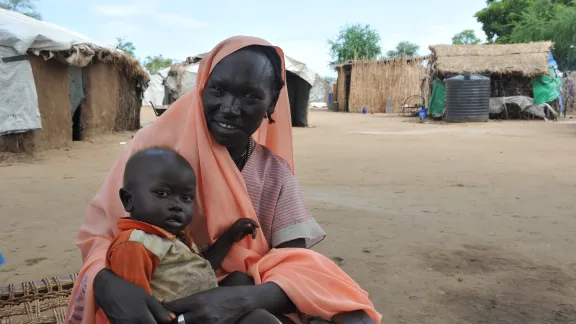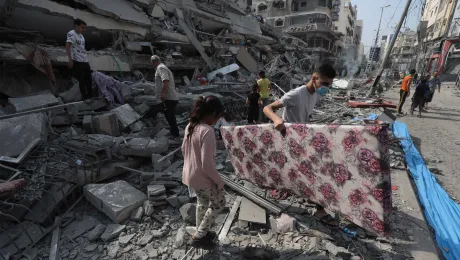
A mother and child in Upper Nile State, South Sudan. The rights of women and children were one of the things found lacking in the LWF submissions to the UPR reports of Uganda and South Sudan. Photo_ LWF/ C. Kästner
The Lutheran World Federation (LWF) works to improve the human rights situation in South Sudan and Uganda through the Human Rights Council Universal Periodic Review (UPR) mechanism.
Since 2015, the LWF has implemented global social and economic development programs in several LWF Country Programs including in South Sudan and Uganda in partnership with Bread for the World, Church of Sweden, Finn Church Aid; and the Finnish Evangelical Lutheran Mission (FELM). The global program adopts a rights-based approach to development as its basis and a local-to-global advocacy model that engages with several United Nations Human Rights mechanisms, of which the UPR is the most important.
Assessing human rights in UN member states
The Universal Periodic Review (UPR) is a unique mechanism of the United Nations Human Rights Council (HRC) aimed at improving the human rights situation on the ground of each of the 193 United Nations member states. Under this mechanism, the human rights situation of all UN member states is reviewed every 4.5 years. As part of the process, civil society organizations (CSO) are invited to submit first-hand reports, so-called parallel reports. The member states can take these findings into consideration when they present their list of recommendations to the country under review.Lauded as one of the most innovative instruments for enhancing human rights for all, the UPR’s second cycle concluded last week by examining the human rights situation in South Sudan and Uganda.
Assisting local organizations to gather data
The UPR reviews of South Sudan and Uganda were preceded by the submission of the national reports of both governments, documenting their current human rights situation. To ensure a comprehensive understanding of the human rights situation beyond the official government narratives, national human rights institutions and CSOs submitted parallel reports. The LWF has been instrumental in helping local organizations to collect and compile data for their UPR submissions.
The CSOs’ reports, data which were collected through community and focus group discussions, interviews and rigorous desk-based research, made recommendations on how the governments of South Sudan and Uganda can improve on certain, human rights issues.
In the case of South Sudan, the report specifically mentioned the following human rights issues: lack of access to justice and rule of law; disregard of the right of women and children; a need to ensure free expression and media; disregard of the rights of refugees and internally displaced persons; lack of access to social and economic services and a need for transitional justice and reconciliation.
Similarly, the Uganda CSOs report underlined that, in addition to the concerns shared with South Sudan, improvement was needed in the areas of the right to education; rights of persons and children with disabilities; and refugee host and post-conflict communities.
Supporting human rights defenders
The LWF’s robust advocacy efforts during the UPR pre-session for both countries last month were an important contribution to the UPR process. Using the local to global framework, the LWF ensured that human rights defenders from Uganda and South Sudan could travel to international centers, such as Geneva and Helsinki, to meet state actors and lobby their human rights priority issues identified in the CSOs submissions.
As only state actors can make recommendations in the UPR Working Group Sessions, it is necessary to facilitate contact between governments and local human rights defenders to have a full picture of a country’s human rights situation. This advocacy component is important to ensure the recommending states corroborate their statements with the information provided by the local human rights activists so as to make well-informed recommendations to the state under review.
In this context it was rewarding that a number of the recommendations made by the LWF partner organizations in the two countries have been relayed to the South Sudanese and Ugandan governments. Even more promising is the fact that the governments of South Sudan and Uganda have sent out strong signals that they will accept many of these recommendations.
However, this is only the beginning. The LWF will continue its efforts to empower local partners to monitor and follow up the next steps of the process, to ensure that the accepted recommendations are swiftly and structurally implemented by both governments to improve the human rights situation in their respective countries.
Emmanuel Gore is Advocacy Consultant in the Office for International Affairs and Human Rights, Department for Theology and Public Witness, The Lutheran World Federation.


